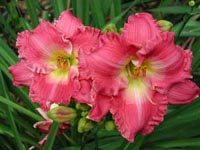Resource Library
Plant of the Week: Daylilies, New Hybrid
The University of Arkansas System Division of Agriculture does not promote, support or recommend plants featured in "Plant of the Week." Please consult your local Extension office for plants suitable for your region.
Plant of the Week
[A-Z]
New Hybrids of Daylilies
Latin: Hemerocallis

Last week in Rogers as I sat in the daylily auction held during the Region 13 meeting of the American Hemerocallis Society, I was amazed by the prices paid for the new hybrids. Single plants went for as much as $250, with the hundred plants sold averaging about $70 each. These plants, all new and still scarce introductions, were donated by breeders and friends of the Society to support publication of the ArkLa Daylily newsletter. But it quickly became apparent that people were bidding, not so much in a sense of charitable giving, but because of a need to possess.
Now, I like daylilies just fine, but I must admit to falling by the wayside when prices exceeded $50; an arbitrary limit I set in my mind before bidding began. My collecting passions run in other directions; only those who are book lovers can understand why I pay such outrageous prices for some dusty old tome that catches my eye. The noise and excitement of the auction got me to wondering why is it we collect things we don’t need.
It turns out that I’m not the first to consider this question. Thoreau, America’s most literate and first hippy, considers possessions in Walden as he debates the fate of the three rocks sitting on his desk. He finally threw them out the window in disgust because they required dusting each morning while his mind remained undusted.
There appears to be no easy answer to our urge to collect, but most of us fall somewhere between the casual hobby collector and the seriously deranged individual with an excessive-compulsive disorder. Human nature being what it is, we tend to view those who have different collecting interests a bit more harshly than we view ourselves. My collection of books on exploration makes perfect sense but your collection of high priced daylilies marks you as a bit nuts!
Psychologists don’t give a very clear explanation of why we collect things but it seems most collectors gather in things that make them feel good, that help define themselves as a person and serve as a touchstone for remembrance.
Searching the web, I ran across an essay by Deborah Wills who surveyed her fellow conchologists (people who collect seashells - they must really be nuts!) about what feeds their urge to collect something as esoteric as seashells.
As you would expect, there was no one answer. After reviewing their responses, it became apparent that gardeners and conchologists share a lot of traits. The most frequently mentioned reason for collecting was for the mental exercise, followed closely by an appreciation of the beauty of the shells and the enjoyment they received from creating order in one little slice of their lives.
One astute observer said, "...in some way it enables us to control our world, rather than having the world control us. We limit or expand our collection as we see fit, we make our own rules of what we collect, we change our mind and shift our focus to other areas."
Another aspect of collecting was that it often reminded them of a journey, both in time and space. Many began their own hobbies of collecting because loved ones in their past were collectors, and it reminded them of those early, warm feelings.
Others used collecting as a way to bring back fond feelings from an actual journey. Thoreau would be aghast to see the dusty rocks on my bookshelf, mementoes of trips I’ve enjoyed throughout my life.
Several people, probably the metaphorical hunters of the ancient clan of mankind, like the seeking-out aspect of collecting. Their greatest joy comes in finding and capturing, not necessarily in possessing. Finally, many said they enjoyed the physical activity of collecting, just as most gardeners enjoy the physical activity of working in the soil.
Marketing people take a different approach to why people collect stuff. They feel the overriding reason is that it improves your perceived quality of life. They further argue that purchases made to satisfy emotional needs are no less compelling than purchases made to satiate physical needs. They tell us that men are the new collectors and that they are willing to spend more on their collections than women. Men justify their collection as an "investment" - in fact I recall having used that line a time or two myself!
But whatever the reason for collecting, it seems to be part of what makes us human. Personally I’ve always wondered a bit about people who didn’t collect something. After all, a little clutter and compulsion in your life can be a good thing.
By: Gerald Klingaman, retired
Extension Horticulturist - Ornamentals
Extension News - July 9, 2004
The University of Arkansas System Division of Agriculture does not maintain lists of retail outlets where these plants can be purchased. Please check your local nursery or other retail outlets to ask about the availability of these plants for your growing area.